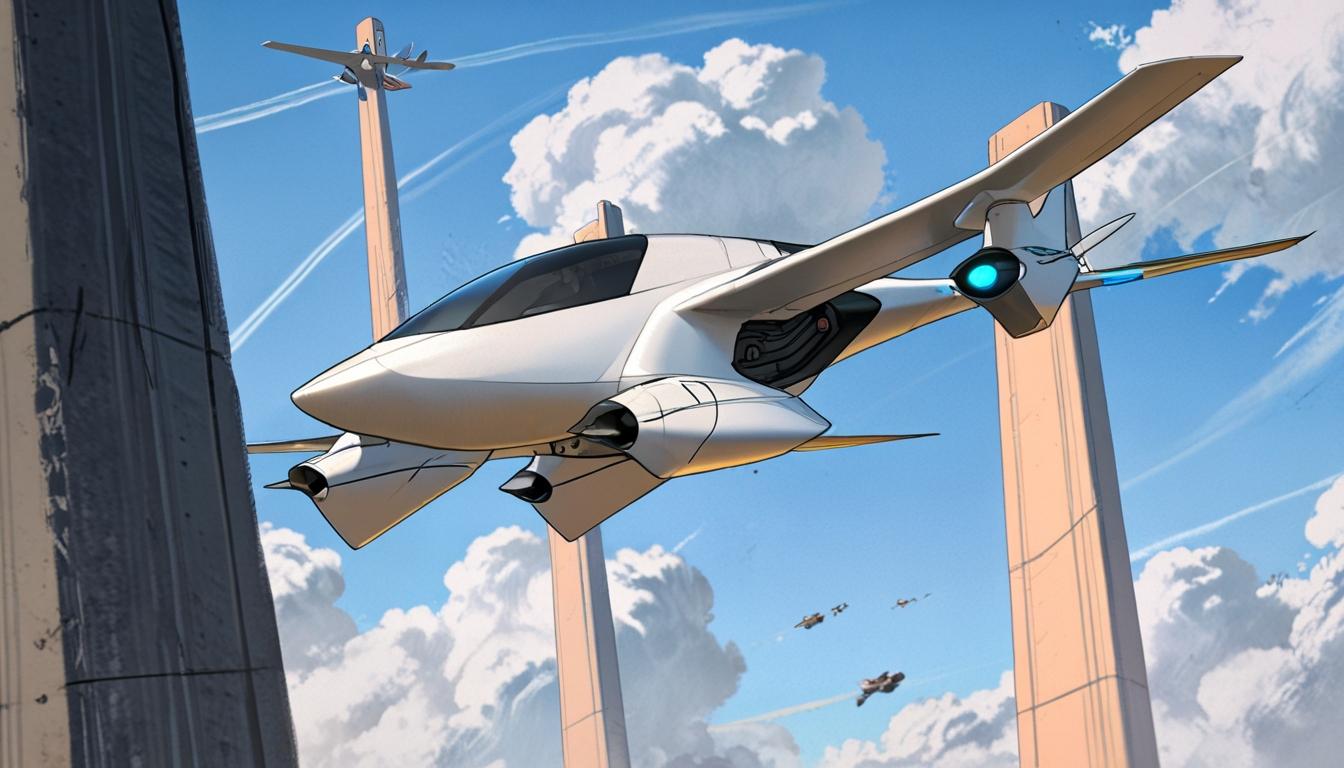The inaugural Jetson ONE pylon race showcased a groundbreaking leap in electric vertical take-off and landing technology by combining intense pilot skill with sustainable aviation, setting the stage for a new global motorsport discipline powered by manned flying cars.
The Jetson ONE eVTOL race has truly carved its niche in the budding world of electric vertical take-off and landing (eVTOL) technology, exemplifying a significant leap forward in both flying car capabilities and competitive aviation. This event, hailed as a pivotal moment, was not just a display of futuristic transport but a genuine competition where pilots navigated intricate courses filled with towering pylons, tight turns, and narrow aerial corridors.
The Jetson ONE, a remarkable feat of engineering, is designed not only for performance but also for safety. Its lightweight structure utilises advanced materials like aluminium and carbon fibre, housing an eight-motor powertrain capable of achieving impressive speeds and manoeuvrability. With a flight time averaging around 20 minutes, the aircraft has been rigorously tested for agility and responsiveness. According to the company, no piloting license is required to operate the Jetson ONE in the United States, broadening accessibility and allowing a diverse cohort of enthusiasts to engage with this innovative technology.
What made this race particularly compelling was the real-world application of the Jetson ONE. Unlike traditional air races dominated by military jets or unmanned drones, the involvement of human pilots offered a new, dynamic layer to competitive flying. Participants described the experience as both intense and exhilarating, where every second and precise manoeuvre was crucial. The aircraft’s intuitive controls and excellent visibility contributed to the high demands of the race, pushing both pilot and machine to their limits.
This inaugural event marks the commencement of what could become a global sport. The Jetson Pylon Series, introduced alongside the race, features 8-meter tall pylons expressly designed to challenge and assess pilot skill alongside machine precision. By integrating sustainable, electric-powered aviation into the thrill of motorsports, Jetson is pioneering a novel racing discipline aimed at both innovation and competitive excellence. Given the rising interest from spectators, investors, and the media, the potential for flying car races to become a staple in the world of motorsport seems increasingly feasible.
Moreover, this milestone is set against a backdrop of significant regulatory advancements. In October 2023, Jetson became the first ultra-light aircraft manufacturer to achieve certification for flights in uncontrolled airspace in Italy, further validating the practicality of manned eVTOL travel. These developments not only showcase the evolution of personal air transport but also hint at an expanding arena for eVTOL racing, where piloted aircraft could redefine the sporting landscape.
As Jetson continues to innovate and further refine the Jetson ONE, it is clear that this is merely the beginning. The marriage of cutting-edge technology with the adrenaline of racing suggests that eVTOL competitions could soon evolve into an international sensation, leveraging technological advancements while capturing public imagination. The era of the flying car has indeed arrived, bringing with it a thrilling vision of the future where personal air travel, competition, and sustainability harmoniously intersect.
Reference Map
Source: Noah Wire Services
- https://supercarblondie.com/jetson-one-evtol-race-launches-flying-car-sport/ – Please view link – unable to able to access data
- https://jetson.com/news/first-Jetson-pylon-race – Jetson announced the Jetson Pylon Series, introducing custom-designed 8-meter tall pylons for eVTOL racing. These pylons are engineered to test both pilot skill and machine precision, marking a significant step in the evolution of eVTOL racing. The initiative aims to combine the thrill of motorsports with sustainable, electric-powered aviation, offering a new dimension to the world of racing. The company emphasizes the importance of innovation, skill, and the pursuit of excellence in this new racing discipline.
- https://jetson.com/jetson-one – The Jetson ONE is a personal electric vertical take-off and landing (eVTOL) vehicle designed for performance and safety. It features a lightweight aluminum and carbon fiber frame, eight powerful electric motors, and a flight time of approximately 20 minutes. The aircraft is equipped with a race car-inspired safety cell, redundant battery propulsion system, and a ballistic parachute. Notably, no pilot’s license is required in the United States to operate the Jetson ONE, making it accessible to a broader audience.
- https://electrek.co/2023/10/17/jetson-one-flying-car-becomes-first-evtol-certified-for-flight-in-italy/ – In October 2023, Jetson achieved a significant milestone by becoming the first ultra-light aircraft manufacturer to secure certification for flights in uncontrolled airspace in Italy. The Aero Club d’Italia issued a registration certificate for recreational ultralight eVTOL flights, allowing licensed pilots to operate the Jetson ONE pre-production aircraft. Additionally, the Italian Civil Aviation Authority granted operational authorization for unmanned Jetson ONE flights, facilitating accelerated testing and validation of the aircraft before entering scaled production.
- https://www.karmactive.com/first-ever-piloted-evtol-air-race-hits-63-mph-around-26-foot-pylons/ – Swedish startup Jetson conducted the world’s first eVTOL (electric vertical take-off and landing) race with a pilot onboard. The company’s founder and CTO, Tomasz Patan, piloted the Jetson ONE around 26-foot tall pylons, demonstrating the aircraft’s precision and agility. The Jetson ONE achieved a top speed of 63 mph (102 km/h) with a flight time of 20 minutes per charge using high-discharge lithium-ion batteries. This demonstration marks a significant technical progression in personal aerial vehicles and eVTOL racing.
- https://www.foxnews.com/tech/get-ready-experience-thrill-evtol-racing – Airspeeder, an eVTOL racing series, has been building momentum since 2017, aiming to establish world championship races with their striking eVTOL aircraft. However, their current races involve remote-controlled vehicles, with pilots safely on the ground. In contrast, Jetson has demonstrated a crewed flight around a racing pylon, showcasing the potential of eVTOL racing with pilots onboard. The Jetson ONE is a personal eVTOL designed for agility and performance, with a top speed of 63 mph and a flight time of 20 minutes per charge.
- https://jp.headtopics.com/news/jetson-one-sets-stage-for-evtol-races-piloted-agility-63761671 – Jetson has made headlines by pushing the boundaries of electric vertical take-off and landing technology. In the fall of 2023, Jetson secured two important flight permits in Italy, granting approval for personal eVTOL travel in the country’s uncontrolled airspace. The company has also focused on eVTOL racing, with a recent demonstration involving Patan piloting the Jetson ONE around a set of 8-meter tall pylons, showcasing the aircraft’s precision and agility. This marks a significant step in the development of eVTOL racing with pilots onboard.
Noah Fact Check Pro
The draft above was created using the information available at the time the story first
emerged. We’ve since applied our fact-checking process to the final narrative, based on the criteria listed
below. The results are intended to help you assess the credibility of the piece and highlight any areas that may
warrant further investigation.
Freshness check
Score:
8
Notes:
The narrative includes recent developments, such as Jetson achieving certification in Italy in October 2023. It references ongoing innovation and potential future events, indicating a relatively fresh perspective. However, one might expect more recent references or updates for a higher score.
Quotes check
Score:
9
Notes:
There are no direct quotes in the narrative, which means there are no potential issues with reused or unverified quotations.
Source reliability
Score:
6
Notes:
The narrative originates from Supercar Blondie, a site with a focus on automotive and new technology. While it may provide engaging content, it is not a traditional news source like BBC or Reuters, which typically have higher credibility. The information is also supported by references to Jetson’s official news.
Plausability check
Score:
8
Notes:
The claims regarding Jetson ONE’s capabilities and the race event are plausible, given the advancements in eVTOL technology. The narrative aligns with ongoing trends in sustainable aviation and competitive sports. However, some details, like the regulatory advancements, could be verified further for absolute confirmation.
Overall assessment
Verdict (FAIL, OPEN, PASS): OPEN
Confidence (LOW, MEDIUM, HIGH): MEDIUM
Summary:
The narrative seems fresh with recent references, lacks direct quotes, is plausible, and originates from a niche publication. While it presents a compelling vision of eVTOL racing, the reliability of the source and lack of verification on some specifics warrant a cautious assessment.













